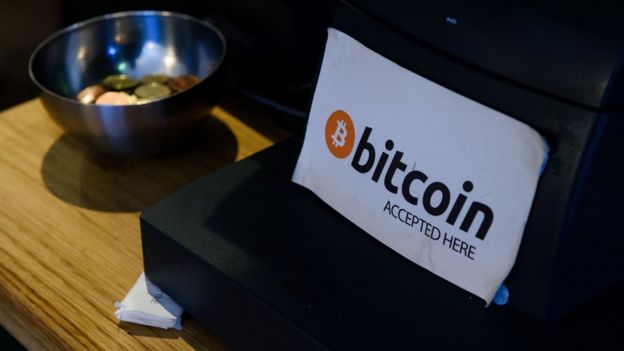
Blockchain’s Peter Smith speaks at the Consensus 2017 conference in New York
The price of Bitcoin, a digital currency once located at the fringe of finance, has been rising to new records in recent months as digital assets move into the mainstream.
On Tuesday, it shot past $2,200 (£1,700), more than doubling from just two months ago. And a newer currency, Ethereum, has climbed even faster.
Industry members say uncertainty surrounding the value of global currencies, including the pound, is driving demand for alternative currencies.
The kind of technology that underwrites Bitcoin and newer entrants such as Ethereum, is also gaining, well, currency, as it gets put to new uses by developers and others looking to beef up cyber-security.
Policy changes in Japan and elsewhere in Asia have made it easier to trade. And of course, when it comes to price, interest generates its own momentum.
“It’s a promising technology,” says Joshua Rosenblatt, 34, a Nashville-based attorney at Frost Brown Todd, a midwestern law firm with offices in eight states. He is both an investor and works in the field. “The returns have been unreal and there’s an aspect of not wanting to miss out on a bubble.”
Industry growth
Bitcoin’s market capitalisation shot past $30bn this month, as the price climbed.
Ethereum remains smaller at about $15bn, but it is growing too. The price spiked from less than $20 in March to about $170 today, according to CoinDesk, which tracks the two currencies.
Activity is also up. The number of daily trades in Bitcoin, which is more established, has rocketed from around 40,000 at the start of 2013 to more than 330,000 today.
 Image copyrightGETTY IMAGES
Image copyrightGETTY IMAGESAbout 2,700 participants attended an industry conference in New York this week, according to Michael Crosby, head of strategy for CoinDesk, which hosted the event.
Mr Rosenblatt, one of the people in attendance, works with smaller investment firms and start-ups, navigating issues relating to coin offerings and “smart contracts”, which use similar technology to enforce and verify business transactions.
In the last year, the number of clients looking for that work has increased from one to about two dozen, he says.
“Our firm is kind of a middle America firm, so the fact that we’re seeing that sort of interest speaks to how much the industry has grown,” he says.
‘Absolute explosion’
Grayscale launched its first digital currency investment trust in 2013.
The New York firm now manages about $400m of investments in digital currencies, up from $60m at the end of 2015, as its client base of wealthy investors, hedge funds and other small firms has grown, and prices for Ethereum and Bitcoin have climbed.
“We’ve seen just an absolute explosion,” says Matthew Beck, an associate at the firm.
Bitcoin: Is the crypto-currency doomed?
‘I bought Bitcoins in 2011 – now they’re worth £19,000’
Bitcoin value tops gold for first time
Mr Beck says the firm expects to continue to attract interest, as investors use digital assets to diversify.
“We’re seeing investors start to diversify… and carve out an allocation for digital assets,” he says.
At the moment Bitcoin is used for cross-border transfers, payments for online activities such as gaming and gambling – and as an investment, says Peter Smith, chief executive of Blockchain, one of the major trading platforms.
The currency also made headlines as the preferred currency of the hackers behind the recent attack that crippled the National Health Service in the UK and other organisations around the world.
Going mainstream
Industry members say some companies may be buying up Bitcoin to deploy in the event of a future attack, but they maintained that broader demand is driving price gains.
“There’s a number of people from family offices [and] private equity firms – they’re making small bets and when you add that type of liquidity to the market, that’s going to drive the price up,” says Mr Crosby.
This year’s Consensus conference drew some big corporate names, such as insurer State Farm, carmaker Toyota, and consulting firm Deloitte.
 Image copyrightGETTY IMAGES
Image copyrightGETTY IMAGESFidelity Investments, a staid, Boston-based money manager known for handling retirement accounts, was one of the presenters. It now accepts Bitcoin in its cafeteria and will soon launch a feature to allow clients to check on their digital currency holdings alongside other investments.
In the scheme of global finance, a $30bn market remains “trivial”, says Blockchain’s Peter Smith. But interest from those players is a sign the industry is becoming more accepted.
“It has truthfully gotten a lot more mainstream and that’s a beautiful thing to see in many ways,” he says.
Looking at the long term
For 49-year-old Stuart Fraser, the climbing price has meant a tidy return on the roughly £15,000 worth of Bitcoin he bought in early 2014.
He estimates his holdings have more than doubled, even after subtracting the Bitcoin he used to buy a virtual reality headset and make investments in the newer Ethereum.
Investors say they are prepared for a boom-bust cycle as the market continues to evolve, technology changes, and regulations come into play.
But Mr Fraser, the managing director of Scotland-based financial technology start-up Wallet.Services, who previously worked in cyber-security, says unless he sees a promising new competitor, he doesn’t plan to cash in now.
“I think [in the] long term, it’s going to go up.”
[“Source-ndtv”]
